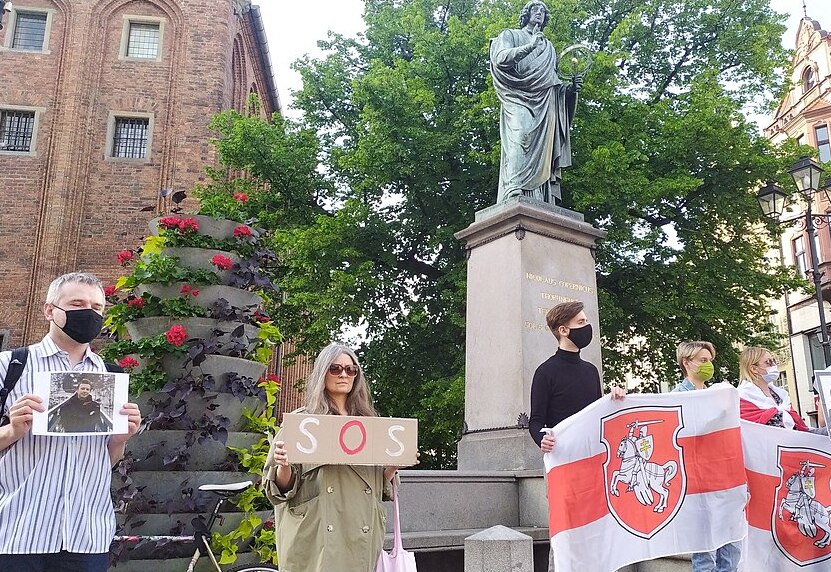Relations between the West and Belarus will be unlikely to be the same after the country’s President Alexander Lukashenko reportedly ordered its security services to force a Ryanair plane, flying from Athens to Vilnius, to land in Minsk, which resulted in the imprisonment of a dissident activist Roman Protasevich. The European Union has already decided to close its air space to all Belarusian airlines and will consider additional targeted economic sanctions. But how will Russia – Lukashenko’s major ally – react?
The Kremlin was quick to dismiss the West’s furious response as hypocritical. Russia’s Foreign Ministry spokeswoman Maria Zakharova said that it is “shocking that the West calls the incident in Belarusian airspace shocking”.
“They either need to be shocked by every such incident, including the landing of the Bolivian air force one in Austria at the request of the United States, or should not be so emotional about similar behavior by others”, Zakharova wrote on Facebook.
Indeed, such incidents have happened several times in the past. In July 2013, a plane carrying the then-Bolivian President Evo Morales home from Russia was diverted to Vienna amid suspicions that it was carrying the surveillance whistleblower, Edward Snowden. The country’s defense minister Ruben Saavedra said that it was “a hostile act by the United States State Department which has used various European governments”. Morales finally left after spending 12 hours at the airport.
In July 2020, Belarussian law enforcement detained 33 mercenaries from the private Russian military contractor Wagner Group. Belarusian authorities accused the Kremlin-linked military contractors of sending 200 fighters to destabilize the country ahead of the presidential election, organizing a Ukrainian-style Maidan revolution and overthrowing the country’s leader. They were, however, released days after the election.
In 2010, Kyrgyzstan confirmed that Iran forced one of its planes on a flight from Dubai to Bishkek to land, and arrested two passengers. A plane flying was made to land in the southern Iranian city of Bandar Abbas, escorted by two Iranian jets. Iranian authorities later announced that that they had seized the leader of the Sunni rebel group Jundallah, Abdolmalek Rigi, who was on the flight.
In October 2016, after the Belavia Belarusian Airlines flight took off from the Kiev airport, the dispatcher told the plane commander that the aircraft should return to Ukraine. Moreover, the pilots were reportedly threatened with military aviation. After the landing, Armenian journalist Armen Martirosyan was taken out of the plane and detained, but was eventually released.
Unlike Martirosyan, Roman Protasevich – a co-founder of Warsaw-based Nexta TV, the most important Belarusian Telegram channel – will unlikely be set free any time soon. He could face a long term jail for his alleged cooperation with the Polish special services, as well as for his opposition activism. Some Russian media have accused him of fighting in the Donbass war on the side of the Ukrainian neo-Nazi Azov battalion, and his fate will largely depend on his cooperation with the Belarusian authorities. It is believed that the country’s security apparatus expects Protasevich to provide useful information on other exiled Belarusian opposition figures.
Meanwhile, having consolidated his power, Lukashenko will continue suppressing any opposition attempts to force a regime change in the Eastern European nation. As all major opposition leaders are either behind bars or in exile, he will now focus on the media. The Belarusian leader has reportedly signed an amendment to the country’s media law that completely prohibits journalists from covering rallies if the protests have not been approved by the authorities. Moreover, the law will allow the state to shut down the internet in cases of “threat to national security”, which means that it will be extremely difficult for the remnants of the Western-backed opposition to organize and stage protests against Lukashenko.
The West, on the other hand, is expected to keep imposing sanctions on Belarus. The European Union already completely banned Belarusian airlines from using EU air space and airports, and some EU airlines will no longer be flying to the Eastern European country. Additional economic sanctions will likely be implemented in the near future, and the main beneficiary, at least in the mid-term, could be Russia. If Minsk imposes counter-sanctions on the European airlines, all flights to Belarus will now have to go via Russian airports. In addition, given that Lukashenko is now a persona non grata in the West, it is very improbable that he will have a choice but to play the Russian card.
The Kremlin’s demands are well known – intensification of military cooperation, as well as deeper Minsk’s integration into the Russia-Belarus Union State. Some authors believe that such a fusion could force Lukashenko to eventually allow Russian oligarchs to privatize successful Belarusian state-owned companies. One thing is for sure – days of Lukashenko’s “multi-vector” foreign policy are all gone. In the foreseeable future, his Soviet-style economic model could also be buried, and the country’s dependency on Russia will increase.
Image credit: Паўлюк Шапецька

